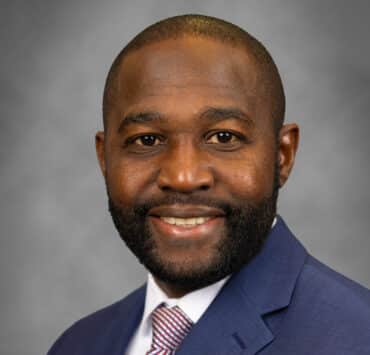An interesting observation by Dr. Ray Gensinger is that there is sometimes an overreliance on technology in medicine.
“In our ability to aggregate and transmit data to patients and providers through electronic health records [EHRs], we’ve made it more difficult for clinicians to spend time just talking with patients or peers,” the senior vice president and chief medical officer at Tegria says. In other words, providing medical information via email is a poor substitution for a conversation between the doctor and patient about such things as cholesterol levels or iron deficiencies. Doctor-to-doctor consultations similarly suffer.
However, Gensinger is a true believer in what technology has and will do to hugely improve medicine and health outcomes. He believes great advances in human health will continue to unfold in meaningful, life-extending ways. Additionally, he believes the efficiencies that can be gained will return valuable time to allow those lost conversations to return. But he advocates for conscious and careful uses of data, artificial intelligence (AI), machine learning, and othertwenty-first century tools that are sure to come.
“I asked, ‘Why have I gone into healthcare in the first place?’ I had the skills to make a difference as a doctor . . . In my new position at Tegria, we can favorably impact many millions of people.”
Dr. Ray Gensinger
Gensinger’s enthusiasm for technology goes way back. When he was in high school in the early 80s, he owned an Apple II computer. As a medical student about a decade later—before a consumer-friendly version of the internet even existed—he naturally gravitated to using an early version of computer spreadsheets on his laptop to organize clinical notes. This was the era when pharmacists had to decipher doctors’ handwritten prescriptions since EHRs did not exist.
In his postdoctoral studies in the mid 90s, Gensinger delved into the emerging field of medical informatics. “I liked how it put healthcare onto a common platform,” he remembers, adding how this was also a time when something as simple as voice recognition software began to enable dictating notes instead of writing them by hand.
He was then hired as a general internist but allocated about 20 percent of his time to developing the informatics program (he spent the other 80 percent practicing medicine). Within a few years, that flipped to 80 percent in IT, 20 percent as a clinician.
Gensinger eventually became the chief information officer at Hospital Sisters Health System, a Springfield, Illinois-based institution serving fourteen communities with fifteen hospitals in Illinois and Wisconsin. He held that position for more than eight years before recently moving on to Tegria, a healthcare services company that uses technologies to optimize patient care and improve operational efficiencies.
This was not a path dictated by what came easiest to him. Gensinger looks at his career arc as a continuous build in how many people he could help.
“I asked myself, ‘Why have I gone into healthcare in the first place?’” he reflects. “I had the skills to make a difference as a doctor, and I’ve probably seen somewhere around twenty-five thousand patients in my life. But by moving into hospital technology, my sphere of influence expanded to hundreds of thousands of people. In my new position at Tegria, we can favorably many millions of people.”
“In healthcare, one of the biggest threats is change. It works best when we deliver learning in bite-size pieces.”
Dr. Ray Gensinger
In his previous position as well as his new job, Gensinger takes a pragmatic approach to selecting and introducing new technologies. “In healthcare, one of the biggest challenges is change,” he says. “It works best when we deliver learning in bite-size pieces.”
What is clear from experience in the past several years is that technology enabled for smartphones is what hospital staff want. “Wireless and mobility have won the day,” Gensinger says. “I love my laptop but even I go to my phone much of the time.”
Any leader in a hospital IT system must handle questions of integration when a new platform comes along. Gensinger says that some niche standalone programs might be worth having, but platforms that can work with existing software have a clear advantage. Given the complexity of hospitals in a modern era, one can only imagine the choices that must be made in this regard.
Gensinger acknowledges that personal privacy issues are a foremost concern, but believes with proper regulations individual patient, data can be protected. Experiential analytics, like combining AI and machine learning, will be more valuable because it comes from diverse, population-representative data, overcoming past deficiencies in medical research that drew from nonrepresentative demographic groups.
It’s ultimately an exciting amount of good news for all hospital systems on the horizon, particularly given the wealth of data that these institutions generate. “Healthcare organizations are just beginning to recognize what they’re sitting on,” Gensinger says. “Healthcare data will create a whole new economy.”
Health Catalyst is a leading provider of data and analytics technology and services to healthcare organizations, committed to being the catalyst for massive, measurable, data-informed healthcare improvement.


